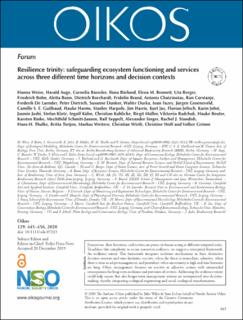Bitte benutzen Sie diese Kennung, um auf die Ressource zu verweisen:
https://doi.org/10.21256/zhaw-20323| Publikationstyp: | Beitrag in wissenschaftlicher Zeitschrift |
| Art der Begutachtung: | Peer review (Publikation) |
| Titel: | Resilience trinity : safeguarding ecosystem functioning and services across three different time horizons and decision contexts |
| Autor/-in: | Weise, Hanna Auge, Harald Baessler, Cornelia Bärlund, Ilona Bennett, Elena M. Berger, Uta Bohn, Friedrich Bonn, Aletta Borchardt, Dietrich Brand, Fridolin S. Chatzinotas, Antonis Corstanje, Ron De Laender, Frederik Dietrich, Peter Dunker, Susanne Durka, Walter Fazey, Ioan Groeneveld, Jürgen Guilbaud, Camille S. E. Harms, Hauke Harpole, Stanley Harris, Jim Jax, Kurt Jeltsch, Florian Johst, Karin Joshi, Jasmin Klotz, Stefan Kühn, Ingolf Kuhlicke, Christian Müller, Birgit Radchuk, Viktoriia Reuter, Hauke Rinke, Karsten Schmitt‐Jansen, Mechthild Seppelt, Ralf Singer, Alexander Standish, Rachel J. Thulke, Hans‐H. Tietjen, Britta Weitere, Markus Wirth, Christian Wolf, Christine Grimm, Volker |
| et. al: | No |
| DOI: | 10.1111/oik.07213 10.21256/zhaw-20323 |
| Erschienen in: | Oikos |
| Band(Heft): | 129 |
| Heft: | 4 |
| Seite(n): | 445 |
| Seiten bis: | 456 |
| Erscheinungsdatum: | 13-Jan-2020 |
| Verlag / Hrsg. Institution: | Wiley |
| ISSN: | 0030-1299 1600-0706 |
| Sprache: | Englisch |
| Schlagwörter: | Concept; Ecosystem; Ecosystem service provisioning; Management; Resilience |
| Fachgebiet (DDC): | 577: Ökologie 658.4: Leitendes Management |
| Zusammenfassung: | Ensuring ecosystem resilience is an intuitive approach to safeguard the functioning of ecosystems and hence the future provisioning of ecosystem services (ES). However, resilience is a multi‐faceted concept that is difficult to operationalize. Focusing on resilience mechanisms, such as diversity, network architectures or adaptive capacity, has recently been suggested as means to operationalize resilience. Still, the focus on mechanisms is not specific enough. We suggest a conceptual framework, resilience trinity, to facilitate management based on resilience mechanisms in three distinctive decision contexts and time‐horizons: 1) reactive, when there is an imminent threat to ES resilience and a high pressure to act, 2) adjustive, when the threat is known in general but there is still time to adapt management and 3) provident, when time horizons are very long and the nature of the threats is uncertain, leading to a low willingness to act. Resilience has different interpretations and implications at these different time horizons, which also prevail in different disciplines. Social ecology, ecology and engineering are often implicitly focussing on provident, adjustive or reactive resilience, respectively, but these different notions of resilience and their corresponding social, ecological and economic tradeoffs need to be reconciled. Otherwise, we keep risking unintended consequences of reactive actions, or shying away from provident action because of uncertainties that cannot be reduced. The suggested trinity of time horizons and their decision contexts could help ensuring that longer‐term management actions are not missed while urgent threats to ES are given priority. |
| URI: | https://digitalcollection.zhaw.ch/handle/11475/20323 |
| Volltext Version: | Publizierte Version |
| Lizenz (gemäss Verlagsvertrag): | CC BY 3.0: Namensnennung 3.0 Unported |
| Departement: | School of Management and Law |
| Organisationseinheit: | Center for Corporate Responsibility (CCR) International Management Institute (IMI) |
| Enthalten in den Sammlungen: | Publikationen School of Management and Law |
Dateien zu dieser Ressource:
| Datei | Beschreibung | Größe | Format | |
|---|---|---|---|---|
| 2020_Weise_etal_Resilience trinity_Oikos.pdf | 1.5 MB | Adobe PDF |  Öffnen/Anzeigen |
Zur Langanzeige
Weise, H., Auge, H., Baessler, C., Bärlund, I., Bennett, E. M., Berger, U., Bohn, F., Bonn, A., Borchardt, D., Brand, F. S., Chatzinotas, A., Corstanje, R., De Laender, F., Dietrich, P., Dunker, S., Durka, W., Fazey, I., Groeneveld, J., Guilbaud, C. S. E., et al. (2020). Resilience trinity : safeguarding ecosystem functioning and services across three different time horizons and decision contexts. Oikos, 129(4), 445–456. https://doi.org/10.1111/oik.07213
Weise, H. et al. (2020) ‘Resilience trinity : safeguarding ecosystem functioning and services across three different time horizons and decision contexts’, Oikos, 129(4), pp. 445–456. Available at: https://doi.org/10.1111/oik.07213.
H. Weise et al., “Resilience trinity : safeguarding ecosystem functioning and services across three different time horizons and decision contexts,” Oikos, vol. 129, no. 4, pp. 445–456, Jan. 2020, doi: 10.1111/oik.07213.
WEISE, Hanna, Harald AUGE, Cornelia BAESSLER, Ilona BÄRLUND, Elena M. BENNETT, Uta BERGER, Friedrich BOHN, Aletta BONN, Dietrich BORCHARDT, Fridolin S. BRAND, Antonis CHATZINOTAS, Ron CORSTANJE, Frederik DE LAENDER, Peter DIETRICH, Susanne DUNKER, Walter DURKA, Ioan FAZEY, Jürgen GROENEVELD, Camille S. E. GUILBAUD, Hauke HARMS, Stanley HARPOLE, Jim HARRIS, Kurt JAX, Florian JELTSCH, Karin JOHST, Jasmin JOSHI, Stefan KLOTZ, Ingolf KÜHN, Christian KUHLICKE, Birgit MÜLLER, Viktoriia RADCHUK, Hauke REUTER, Karsten RINKE, Mechthild SCHMITT‐JANSEN, Ralf SEPPELT, Alexander SINGER, Rachel J. STANDISH, Hans‐H. THULKE, Britta TIETJEN, Markus WEITERE, Christian WIRTH, Christine WOLF und Volker GRIMM, 2020. Resilience trinity : safeguarding ecosystem functioning and services across three different time horizons and decision contexts. Oikos. 13 Januar 2020. Bd. 129, Nr. 4, S. 445–456. DOI 10.1111/oik.07213
Weise, Hanna, Harald Auge, Cornelia Baessler, Ilona Bärlund, Elena M. Bennett, Uta Berger, Friedrich Bohn, et al. 2020. “Resilience Trinity : Safeguarding Ecosystem Functioning and Services across Three Different Time Horizons and Decision Contexts.” Oikos 129 (4): 445–56. https://doi.org/10.1111/oik.07213.
Weise, Hanna, et al. “Resilience Trinity : Safeguarding Ecosystem Functioning and Services across Three Different Time Horizons and Decision Contexts.” Oikos, vol. 129, no. 4, Jan. 2020, pp. 445–56, https://doi.org/10.1111/oik.07213.
Alle Ressourcen in diesem Repository sind urheberrechtlich geschützt, soweit nicht anderweitig angezeigt.